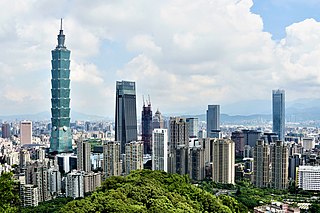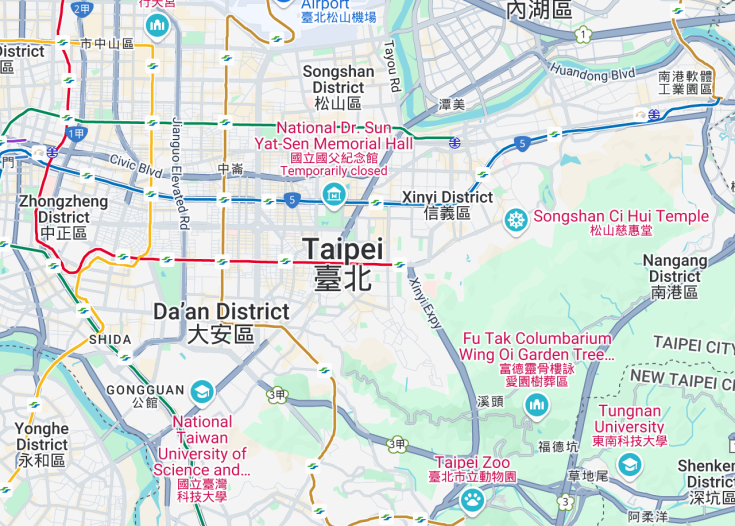Taipei, the vibrant capital of Taiwan, effortlessly blends tradition with modernity. As a cultural hub, it boasts impressive skyscrapers, ancient temples, and lush green spaces. The city is renowned for its exuberant night markets, delicious street food, and the iconic Taipei 101 tower, which offers breathtaking views.
Its warm locals and rich history invite exploration, making Taipei a must-visit for anyone intrigued by the diversity and dynamism of urban Asian cultures.
Explore the city’s efficient public transit system to navigate comfortably and affordably. Taipei’s MRT system connects major attractions efficiently.
Don’t miss sampling Taipei’s famous bubble tea and checking out the bustling Shilin Night Market for a taste of local life and cuisine.
Top things to do & see in Taipei
Select the following sights and activities to discover best tickets and tours available in Taipei.
Taipei: The Heartbeat of Taiwan
| Country | Taiwan |
| Time in Taipei | GMT+8 |
| Language spoken | Mandarin Chinese |
| Population | 2,646,204 (World Population Review) |
| Currency | New Taiwan Dollar (NTD $ / TWD) |
| Airports |
|
Taipei, the vibrant capital of Taiwan, is a city that melds traditional Chinese culture with the dynamism of a modern metropolis. As the political, economic, and cultural center of Taiwan, Taipei is known for its bustling streets, contemporary architecture, and rich history. The city’s skyline is dominated by the iconic Taipei 101, one of the tallest buildings in the world, which symbolizes its economic progress and technological prowess.
Taipei’s history dates back to the early 18th century when it was settled by Han Chinese immigrants. Over the centuries, it has been under the rule of various regimes, including the Qing dynasty and the Japanese empire, before becoming the capital of Taiwan in 1949. Each of these periods has left an indelible mark on the city’s cultural and architectural landscape, making Taipei a fascinating place to explore.
The city offers a plethora of attractions, from serene temples like the Longshan Temple to bustling night markets such as Shilin, where visitors can indulge in a wide array of Taiwanese delicacies. The city is also a major hub for arts and culture, hosting numerous festivals and events that highlight both traditional Chinese culture and modern artistic expressions.
Taipei is not only a tourist attraction but also a vital center for education, with several top universities and research institutions. This educational prominence attracts students and scholars from around the world, adding to the city’s diverse cultural tapestry.
Moreover, Taipei serves as an important gateway to the scenic beauties of Taiwan, including the nearby Yangmingshan National Park and the hot springs of Beitou. Whether you’re interested in the hustle and bustle of city life or the tranquility of nature, Taipei offers an engaging mix of both.
Where is Taipei?
Located in the northern part of Taiwan, Taipei is nestled between the Yangming Mountains and the Tamsui River.
Distances:
| Route | Distance by car | Time by car |
|---|---|---|
| Taoyuan to Taipei | 30 miles | 40 minutes |
| New Taipei City to Taipei | 10 miles | 20 minutes |
What is Taipei famous for?
Taipei is renowned for its vibrant street food scene, historical sites like the Chiang Kai-shek Memorial Hall, and its iconic Taipei 101 skyscraper, which offers panoramic views of the city.
History
Prehistoric Times to 1700s: The Foundation of Taipei
Taipei, the vibrant capital of Taiwan, is steeped in a rich tapestry of history that dates back thousands of years. The area now known as Taipei was originally inhabited by Ketagalan aboriginal people before it caught the eye of Han Chinese settlers in the late 17th century. It was during the Qing dynasty that Taipei began to take shape as a significant settlement due to its strategic location for trade and defense.
1880s-1945: Development and Japanese Rule
The turn of the 20th century marked a pivotal era in Taipei’s history. In 1895, Taiwan was ceded to Japan following the First Sino-Japanese War. During the Japanese rule, Taipei underwent extensive modernization. Infrastructure such as roads, railways, and public facilities were developed, significantly transforming the landscape and laying the foundation for future growth. The architectural and cultural influence of this period is still evident in parts of the city today.
1945-Present: Modernization and Growth
Following the end of World War II, Taiwan was returned to Chinese Nationalist control. Taipei was proclaimed the capital of Taiwan in 1949, following the retreat of the Nationalist government from mainland China. In the subsequent decades, Taipei experienced rapid economic growth and industrialization, establishing itself as a global city. The city has become a hub for technology, commerce, and education, marked by its eclectic blend of modern skyscrapers and historic temples.
Visit Taipei
What to see and do in Taipei
Exploring Taipei offers a delightful blend of cultural heritage and modern attractions. Key highlights include the iconic Taipei 101, once the world’s tallest building, which offers panoramic views of the city.
The National Palace Museum, housing one of the largest collections of Chinese imperial artifacts, is a must-visit for history enthusiasts. For a taste of local life, stroll through the bustling night markets such as Shilin and Raohe, where you can savor a variety of street foods. (using ul li markup).
Festivals and Events in Taipei
Taipei is home to vibrant festivals and events throughout the year. The Taipei Lantern Festival, held annually in February, illuminates the city with elaborate lanterns and artworks. Another significant event is the Dragon Boat Festival, typically celebrated in June, featuring exciting boat races and traditional festivities.
Best time to visit Taipei
The best times to visit Taipei are during spring (March to May) and fall (September to November). During these months, the weather is generally pleasant with minimal rainfall, making it ideal for exploring the city’s outdoor attractions and enjoying its festivals.
is Taipei worth visiting?
Taipei is undoubtedly worth visiting for its unique blend of modern urban life and rich cultural heritage. The city offers a broad spectrum of attractions and experiences, ranging from historical sites and museums to vibrant street markets and lush green spaces.
While the weather can be unpredictable, with typhoons in summer and damp winters, the city’s well-organized public transport system makes it easy to navigate. Taipei’s warmth and hospitality, alongside its culinary delights, make it a compelling destination for travelers.









